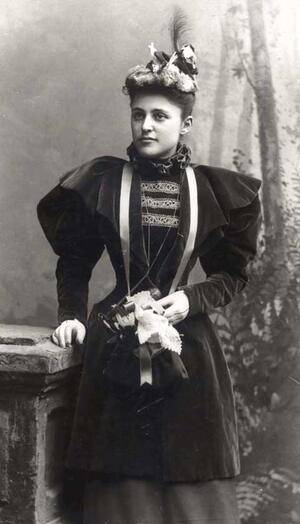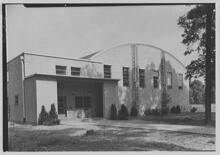Alice Davis Menken
Courtesy of the American Jewish Historical Society.
Alice Davis Menken was an influential social reformer whose work had a notable impact on the field of penology. In 1896, she helped found a Sisterhood at Manhattan’s Sephardi synagogue, Shearith Israel. She began her social relief work through the Sisterhood’s settlement house on the Lower East Side, which served Jewish immigrant communities. While there, Menken became interested in delinquency among young female Jewish immigrants. In 1907, this interest led her to help found the Jewish Board of Guardians. In 1920, Menken was appointed by Governor Alfred E. Smith to the Board of Managers of the New York State Reformatory for Women; she served as its secretary from 1922 to 1932. Her published work pioneered the argument that therapy, not punishment, is the most effective treatment for young delinquents.
Alice Davis Menken once described her greatest weakness as “a too strongly developed optimism.” This optimism—perhaps her greatest strength—guided her volunteer work for over thirty years in the rehabilitation of delinquent girls.
Family & Shearith Israel
The third of the seven children of Michael Marks and Miriam (Maduro Peixotto) Davis, Alice Davis Menken was born on August 4, 1870, in New York City. Descended from several prominent European Sephardi families, she was also a member of the Daughters of the American Revolution on her mother’s side. Her family was closely tied to Manhattan’s Spanish and Portuguese synagogue of New York City (Shearith Israel). Alice was the great-granddaughter of one of its earliest cantors, Moses Levi Maduro Peixotto. She married Mortimer Morange Menken, an attorney, on October 17, 1893. They had a son, Harold Davis Menken, in 1895.
Menken helped to establish the Shearith Israel Sisterhood in 1896 and served as its president from 1900 to 1929. She began her social relief work in the sisterhood’s settlement house on New York City’s Lower East Side, the Neighborhood House, which served the area’s predominantly Jewish immigrant community. After 1908, when political upheaval in the Ottoman Empire sparked an influx of Sephardi immigrants to the United States, Neighborhood House shouldered much of the responsibility for these newcomers.
Work with Delinquent Women
Through her sisterhood and settlement house work, Menken became increasingly interested in the rising problem of delinquency among young female Jewish immigrants. In 1908, at the request of city magistrates, Menken founded a sisterhood committee that cooperated with the New York City Probation Department in the Women’s Night Court, assisting Jewish women who had run afoul of the criminal justice system. This project lasted eleven years, until the Women’s Night Court was dissolved.
Menken’s concern for delinquent women led her to help found the Jewish Board of Guardians in 1907. This organization lengthened the period of supervision of delinquents to three years beyond the end of probation. Menken served as chair of the Department of Court, Probation, and Parole of the board’s women’s division, and was the organization’s vice president at the time of her death. Menken also chaired a committee of the National Council of Jewish Women, working with women paroled from various New York State workhouses and prisons.
In 1920, Governor Alfred E. Smith appointed Menken to the Board of Managers of the New York State Reformatory for Women. She served as its secretary from 1922 to 1932. During her career, Menken also held memberships in the Florence Crittendon League, the National Committee on Prisons, the National Probation Association, and the Bureau of Social Service of the New York State Board of Parole. Menken helped to found the Jewish Big Sister movement in 1911. During her travels across the United States gathering information on various services available to delinquent women, she established several Jewish Big Sister chapters.
Menken’s Progressive Approach
Alice Davis Menken stood at the forefront of what her New York Times obituary calls “the evolution of penology from an attitude of sentimentality and punishment to the broader conception of mercy and rehabilitation.” Her many published works argued that therapy, not punishment, was the most effective treatment for young offenders. In addition to the notable impact her work and writing had on the field of penology, Menken effected change on a more personal level. Her commitment to social welfare often led her to take young Jewish female delinquents into her own home. Countless numbers of young Jewish women were encouraged to reform themselves because of Menken’s progressive approach to the problem of delinquency.
For Menken and other middle- and upper-class Jewish women of her generation, social service work—through the National Council of Jewish Women, synagogue sisterhoods, and the various ladies’ auxiliaries and women’s divisions of Jewish communal organizations—provided a means for expressing Jewish values: assisting the community’s poor, infirm, and distressed, and in general attempting to strengthen the moral fabric of society in keeping with Jewish ethical precepts.
Menken’s last and most important book, On the Side of Mercy: Problems in Social Readjustment (1933), summarizes her life’s work and her theoretical approach. In the introduction, New York governor Herbert H. Lehman praises both Menken’s career and the optimism of which she had once spoken so disparagingly. Lehman lauds Menken’s “credo of hope” and her belief that “a real alleviation of many of our social evils” requires only a perfection of social welfare technique and the awareness by the community of the needs of its members.
Alice Davis Menken died on March 23, 1936, in New York City.
AYJB 38:432
Benedict, Libbian. “Mrs. Mortimer M. Menken: Juvenile Delinquency Expert.” The American Hebrew (March 26, 1926): 651
Menken, Alice Davis. Papers, P-23. American Jewish Historical Society, NYC, New York
Obituary. NYTimes, March 24, 1936, 23:1
Pool, David de Sola, and Tamar de Sola Pool. An Old Faith in the New World: Portrait of Shearith Israel. New York: Columbia University Press, 1955
UJE 7
WWIAJ(1928)




